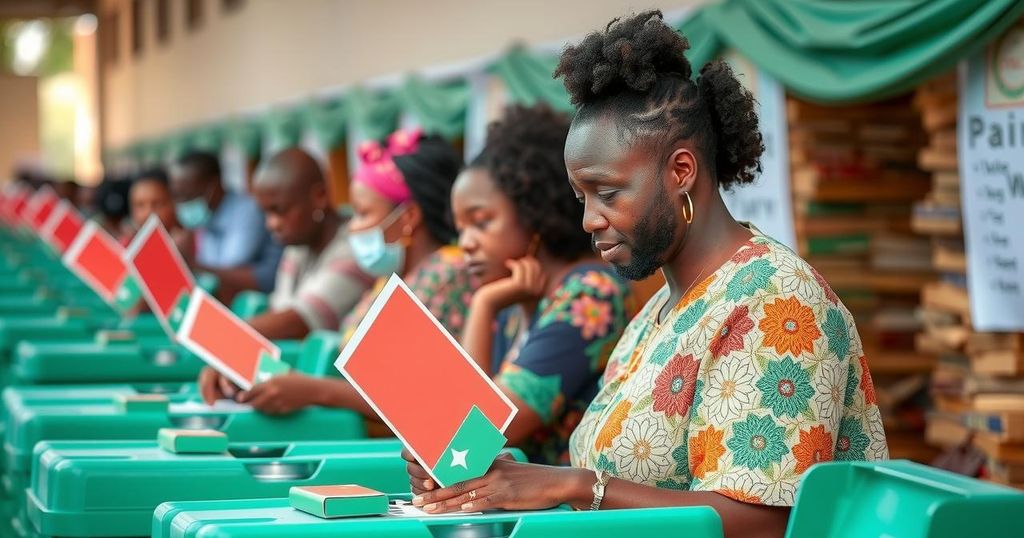Ghana Elections: A Crucial Test Amid Economic Turmoil
Ghana has commenced its presidential and legislative elections, amidst a severe economic crisis affecting public sentiment toward the two main candidates. With historical significance as a democratic leader in West Africa, Ghana faces a pivotal moment as citizens head to the polls, questioning the effectiveness of their leaders in navigating the economic challenges ahead.
Polls opened on Saturday in Ghana for presidential and legislative elections, amid a backdrop of significant economic challenges that could influence the nation’s democratic landscape. Approximately 18.7 million citizens are eligible to vote in a country that once represented a model of democratic governance in West Africa but is now grappling with a severe economic crisis marked by rampant inflation and high unemployment rates.
Historically seen as a bastion of democracy, Ghana has faced increasing difficulties in recent years, with public sentiment reflecting discontent; a study from Afrobarometer revealed that 82% of Ghanaians believe the country is moving in the wrong direction. Despite twelve candidates vying for the presidency, the election is anticipated to be a contest primarily between two major figures: Vice President Mahamudu Bawumia of the ruling New Patriotic Party (NPP) and former President John Dramani Mahama of the National Democratic Congress (NDC).
The NPP is contending with an ongoing economic crisis that has plagued its governance, while the NDC seeks to regain power after Mahama was ousted in 2016 due to unmet economic promises. With the two parties holding an equal number of seats in parliament, the election not only weighs on presidential dynamics but also involves the choice of 276 parliamentary members, further underpinning the political stakes of the day.
In their concluding campaign efforts, Bawumia pledged to continue the economic strategies of the current administration, promising stability and progress. Conversely, Mahama emphasized his intention to “reset” numerous facets of national governance, including democracy, the economy, and infrastructure.
Election day in the capital, Accra, witnessed a vibrant atmosphere, with political activities underscoring the populace’s enthusiasm despite their underlying economic concerns. The nation’s economic condition worsened last year, with the government defaulting on significant foreign debts and experiencing skyrocketing inflation, which reached 54%. Recent governmental efforts to combat illegal gold mining also emerged as a prominent issue amid heightened public scrutiny and concern over environmental damage linked to such activities.
Ghana, as Africa’s leading gold producer, faces the dual challenge of addressing illegal mining practices while seeking to restore economic stability in a fraught political and environmental landscape.
The upcoming presidential and legislative elections in Ghana underscore a critical moment for the nation’s democracy, having historically stood as a model in a region often disrupted by coups and violence. However, current economic struggles, including inflation and job scarcity, have diminished public faith in the capability of political candidates to effectuate meaningful change. With a significant portion of the electorate believing the nation is on the wrong path, the elections could serve as a referendum on leadership and policies amid profound economic distress.
The elections in Ghana represent a pivotal test for the nation, balancing the historic democratic aspirations against current economic adversity. With the populace expressing substantial concern over the direction of the country and the candidates lacking distinct proposals for change, voter sentiment may significantly influence the outcomes. The contest between Bawumia and Mahama encapsulates the broader struggles facing Ghana, as it grapples with economic instability and the need for effective governance amidst pressing challenges.
Original Source: www.voanews.com




Post Comment